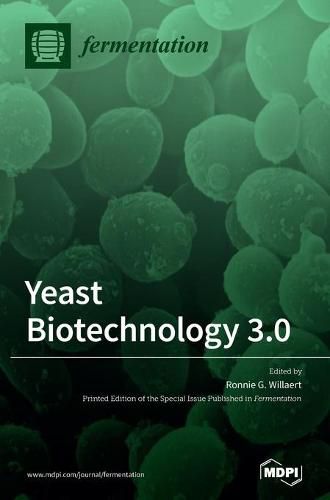Readings Newsletter
Become a Readings Member to make your shopping experience even easier.
Sign in or sign up for free!
You’re not far away from qualifying for FREE standard shipping within Australia
You’ve qualified for FREE standard shipping within Australia
The cart is loading…






This title is printed to order. This book may have been self-published. If so, we cannot guarantee the quality of the content. In the main most books will have gone through the editing process however some may not. We therefore suggest that you be aware of this before ordering this book. If in doubt check either the author or publisher’s details as we are unable to accept any returns unless they are faulty. Please contact us if you have any questions.
Yeasts are truly fascinating microorganisms. Due to their diverse and dynamic activities, they have been used for the production of many interesting products, such as beer, wine, bread, biofuels and biopharmaceuticals. Saccharomyces cerevisiae (bakers’ yeast) is the yeast species that is surely the most exploited by man. Saccharomyces is a top choice organism for industrial applications, although its use for producing beer dates back to at least the 6th millennium BC. Bakers’ yeast has been a cornerstone of modern biotechnology, enabling the development of efficient production processes for antibiotics, biopharmaceuticals, technical enzymes, and ethanol and biofuels. Today, diverse yeast species are explored for industrial applications, such as e.g. Saccharomyces species, Pichia pastoris and other Pichia species, Kluyveromyces marxianus, Hansenula polymorpha, Yarrowia lipolytica, Candida species, Phaffia rhodozyma, wild yeasts for beer brewing, etc. This Special Issue is focused on recent developments of yeast biotechnology with topics including recent techniques for characterizing yeast and their physiology (including omics and nanobiotechnology techniques), methods to adapt industrial strains (including metabolic, synthetic and evolutionary engineering) and the use of yeasts as microbial cell factories to produce biopharmaceuticals, enzymes, alcohols, organic acids, flavours and fine chemicals, and advances in yeast fermentation technology and industrial fermentation processes.
$9.00 standard shipping within Australia
FREE standard shipping within Australia for orders over $100.00
Express & International shipping calculated at checkout
This title is printed to order. This book may have been self-published. If so, we cannot guarantee the quality of the content. In the main most books will have gone through the editing process however some may not. We therefore suggest that you be aware of this before ordering this book. If in doubt check either the author or publisher’s details as we are unable to accept any returns unless they are faulty. Please contact us if you have any questions.
Yeasts are truly fascinating microorganisms. Due to their diverse and dynamic activities, they have been used for the production of many interesting products, such as beer, wine, bread, biofuels and biopharmaceuticals. Saccharomyces cerevisiae (bakers’ yeast) is the yeast species that is surely the most exploited by man. Saccharomyces is a top choice organism for industrial applications, although its use for producing beer dates back to at least the 6th millennium BC. Bakers’ yeast has been a cornerstone of modern biotechnology, enabling the development of efficient production processes for antibiotics, biopharmaceuticals, technical enzymes, and ethanol and biofuels. Today, diverse yeast species are explored for industrial applications, such as e.g. Saccharomyces species, Pichia pastoris and other Pichia species, Kluyveromyces marxianus, Hansenula polymorpha, Yarrowia lipolytica, Candida species, Phaffia rhodozyma, wild yeasts for beer brewing, etc. This Special Issue is focused on recent developments of yeast biotechnology with topics including recent techniques for characterizing yeast and their physiology (including omics and nanobiotechnology techniques), methods to adapt industrial strains (including metabolic, synthetic and evolutionary engineering) and the use of yeasts as microbial cell factories to produce biopharmaceuticals, enzymes, alcohols, organic acids, flavours and fine chemicals, and advances in yeast fermentation technology and industrial fermentation processes.